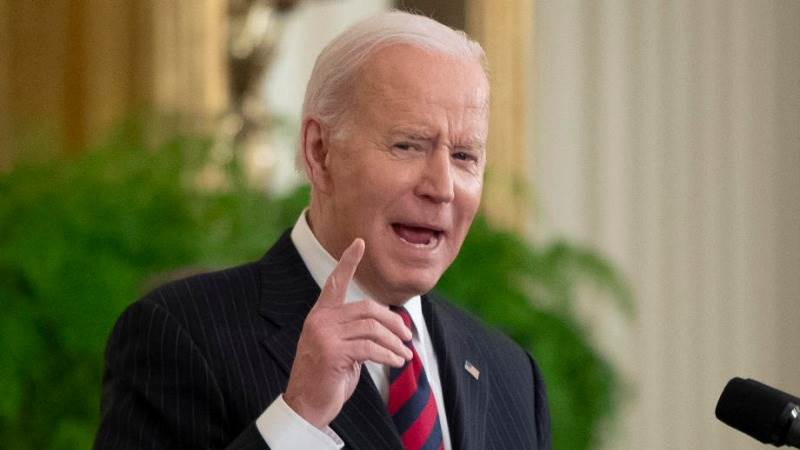Biden offers further military support to Ukraine as Russian troops falter

Joe Biden has risked the wrath of Vladimir Putin by offering Ukraine extra military support as Russian troops appeared to struggle to hold even the territory it has secured since the invasion began.
The US president’s pledge over “further defence cooperation” was said to have been made during a meeting with Ukraine’s foreign minister, Dmytro Kuleba, in Warsaw on Saturday.
Biden’s administration has already made available $1bn worth of military lethal weapons, including Stinger anti-aircraft systems Javelin missiles, light anti-armour weapons.
Volodmyr Zelenskiy has been pushing the US to also facilitate the transfer of MiG-29 fighter jets from Poland but the White House is yet to be convinced by the Ukrainian president’s arguments, fearing a widening of the conflict.
The Kremlin had hinted on Friday that it may be scaling back its war ambitions, saying it was close to completing the “first phase” of its military campaign and would now focus on the complete “liberation” of Donbas in eastern Ukraine.
Speaking to the Guardian, Mykhailo Podolyak, an advisor to President Zelenskiy and the lead negotiator in talks with Russia, said he did not believe that the Kremlin was downgrading its war aims.
“They had poor operational planning, and they realised it was advantageous for them to surround cities, cut off the main supply routes, and force people there to have a deficit of food, water and medicines,” he said, describing the siege of Mariupol as a tactic to sow psychological terror and exhaustion.
However, Podolyak expressed scepticism over the claim from the Russian defence ministry that Moscow’s forces would now focus mainly on the Donbas area in east Ukraine.
“Of course I don’t believe that. They don’t have interests in Donbas. Their main interests are Kyiv, Chernihiv, Kharkiv and the south – to take Mariupol, and to close the Azov sea … we see them regrouping and preparing more troops to send in,” he said.
Earlier on Saturday, the Kremlin had again raised the spectre of the use of nuclear weapons in the war with Ukraine.
Dmitry Medvedev, a former Russian president who is deputy chairman of the country’s security council, said Moscow could strike against an enemy that only used conventional weapons, while Putin’s defence minster Sergei Shoigu claimed nuclear “readiness” was a priority.
Biden, who is due to make what is being billed as a major speech later on Saturday, met Kuleba and Ukraine’s defence minister, Oleksii Reznikov, in what was the first meeting between the US president and the Ukrainian leadership since the war began a month ago.
The US expressed “unwavering commitment to Ukraine’s sovereignty and territorial integrity,” State department spokesman Ned Price said.
Kuleba told reporters that Ukraine had received pledges from Biden and his secretary of state, Antony Blinken, and US defense secretary, Lloyd Austin, on developing defence cooperation.
“We did receive additional promises from the United States on how our defence cooperation will evolve,” Kuleba said. “President Biden said what is happening in Ukraine will change the history of the 21st century, and we will work together to ensure that this change is in our favour, in Ukraine‘s favour, in the favour of the democratic world.”
In his speech later on Saturday, the White House said Biden “will deliver remarks on the united efforts of the free world to support the people of Ukraine, hold Russia accountable for its brutal war, and defend a future that is rooted in democratic principles”.
The meeting with the Ukrainian politicians took place at Warsaw’s Marriott Hotel in the city centre – opposite the central train station where there has been a constant flow of Ukrainian refugees since the conflict started.
In some comments on Saturday, Biden said Poland was taking a “significant” responsibility in the humanitarian crisis and that the world should help lessen the burden.
Biden has held three days of meetings with allies in the G7, Europe and Nato in recent days, and visited US troops in Poland on Friday. He met the Polish president, Andrzej Duda, on Saturday.
